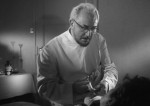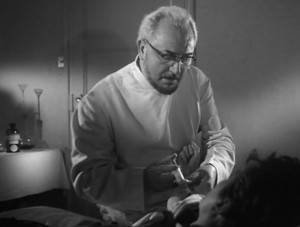
 Screenshot from Franju, La Tête contre les murs. The truth serum is not just a fantasy, the stuff of science-fiction, it is also a political and medical instrument.
Screenshot from Franju, La Tête contre les murs. The truth serum is not just a fantasy, the stuff of science-fiction, it is also a political and medical instrument.
The court case discussed here is a case in point. At the end of 1948, a man with purported mutism, Henri Cens, on trial for acts of collaboration with the German authority during the Occupation, took to court three psychiatrists tasked with establishing the authenticity of his aphasia. The man complained of abusive practices claiming he had been misused in a narco-analytic test by means of what the press called a “truth serum”. Doctors Georges Heuyer, Maxime Laignel-Lavastine et Georges Génil-Perrin, had indeed, at the investigating judge’s behest, injected him with pentothal, then subjected the sleepy subject to a round of questioning while under the influence of the barbiturate. The narco-analytic approach’s purpose is simple: lower mental control in order to access the subconscious which the patient will articulate in their torpor leading to either a diagnosis of illness or simulation, or to therapy.
The drive to explore the subconscious by means of substances that would move a person to an altered state is not new. In the 19th century Moreau de Tours, used hashish to come to grips with mental illness. In the framework of a biological psychiatry addressing a considerable caseload of war trauma, narco-analysis did have, its advocates said, the advantage to be way faster than psychoanalysis, and with apparently miraculous results.
Whereas no objections were raised against narcoanalysis as a therapy, as evidenced by its use in 1940s psychiatric hospitals, its use in legal medicine was more controversial. In the 20s, the American author Robert Ernest House, labelled it “truth serum” when he applied it to suspects during investigations. Although American psychiatrists had early concluded that narcoanalysis was in no way a truth serum, the term caught on in the press. Now this contentious case, was playing out against the post-war years’ peculiar political backdrop.
The 1949 trial was not just a court case; its tenor was also medical and political. It could have passed unnoticed – and incidentally concluded with the acquittal of the accused physicians. It became clear, however that what was at stake was the potentiality of such a thing as a truth serum. With fearful memories of the Occupation’s Totalitarian means of control still fresh, what was one to make of psychiatrists equipped with a truth serum? First to oppose the use of narcoanalysis in legal medicine came, unsurprisingly, the victims of Nazi repression from the Association Nationale des Médecins Déportés et Internés Politiques de La Résistance. At a time when the Nuremberg trials delved at length and in depth into medical experiments on human beings, calls sprang forth for the respect of individual liberties. In the truth serum case, the champions of this defence were the Paris Bar who attacked the medical experts. The Société de Médecine Légale along with the Académie de Médecine also objected to the use of narcoanalysis for moral reasons for, whereas the technique had, at this stage, no other application than to detect deception, in the face of relentless medical progress, guarantees must be sought against potential abuse in the future.
Narcoanalysis figured in press and professional literature articles between 1950 and 1951 but the subject soon ran out of steam. No enactment was ever brought formally to forbid the use of narcoanalysis in medico-legal matters. However, the 1949 court case seems to have stamped out the technique in this field, and this to almost universal approbation. Neither was its use in court evidence more successful abroad than in France. Its representations in popular culture, meanwhile, had only just begun, as Franju’s film La Tête contre les murs (1959) released abroad as The Keepers shows.
Read this paper in its french version : Sérum de vérité
Read more about : LSD
Références :
Georges Heuyer, Narco-analyse et narco-diagnostic, histoire d’un procès, Paris, l’Expansion Scientifique Française, 1949.
Alice Milano, L’affaire du sérum de vérité, la narco-analyse médico-légale et thérapeutique, mémoire de master sous la direction de Hervé Guillemain, Le Mans Université, 2019.
To quote this paper : Alice Milano, "Sérum de vérité" in Hervé Guillemain (ed.), DicoPolHiS, Le Mans Université, 2021.